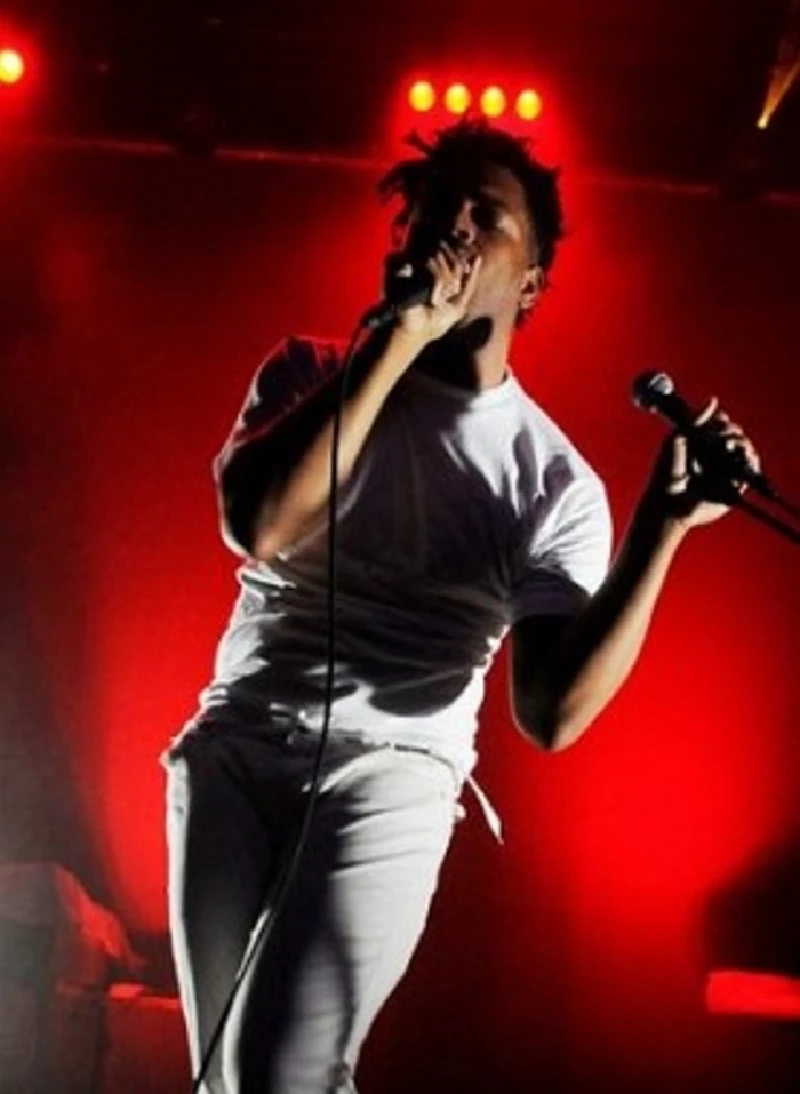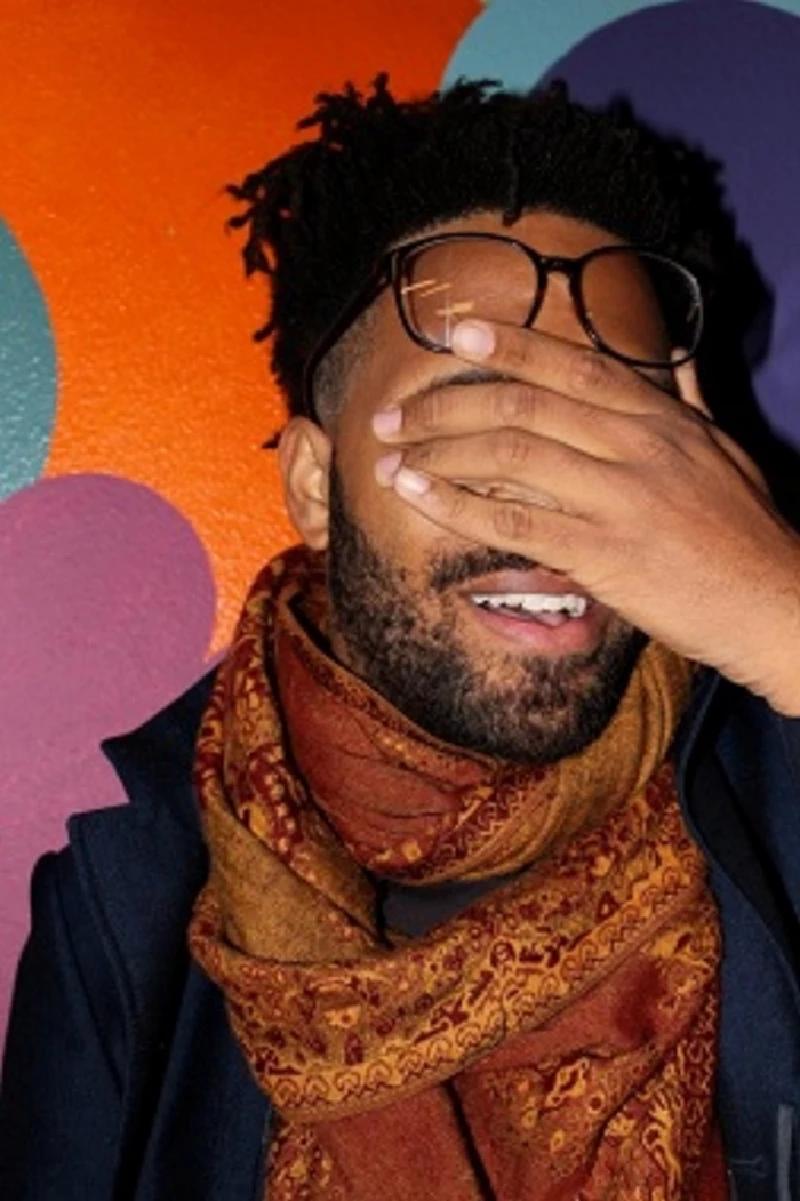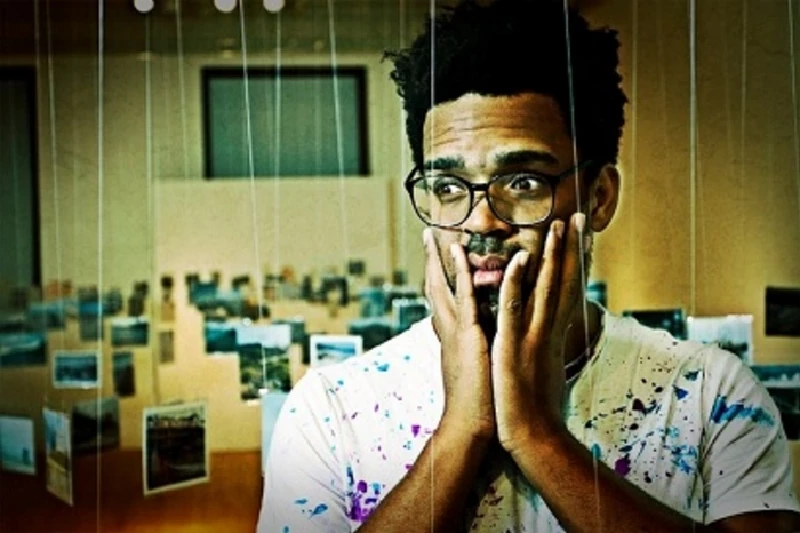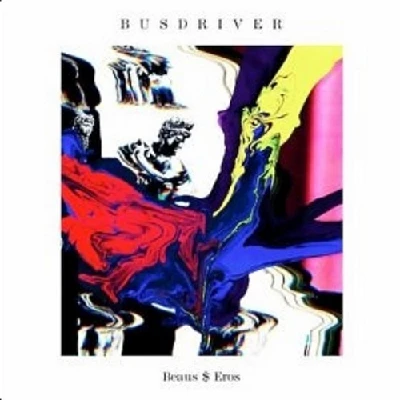Busdriver - Interview
by Admin
published: 23 / 6 / 2012

intro
Mark Rowland and Jamie Rowland speaks to Los Angeles-based rapper Busdriver at a show in London about the internet's influence on rap and his own musical history
Like many confident performers, Busdriver seems like a different person offstage. For a rapper known for the speed and distinctiveness of his delivery, he speaks at a slow, quiet pace. His body language suggests a shyness completely absent from his stage show. In fairness, he has a cold this evening, which may have something to do with his slightly subdued demeanour. Once he hits the stage, however, he shows no sign of illness whatsoever – especially when he delivers a breathless freestyle rap that leaves his audience genuinely astounded. The Los Angeles-born rapper is on tour in the UK for the first time in several years, promoting his new album ‘Beaus$Eros’ (pronounced ‘bows and arrows’); a slight departure from his usual oeuvre. While Busdriver has always had a sense of melody to his raps and often mixes rapping with singing, the new album is much more of an overt electronic pop album than previously. It’s also the first on which he’s worked with a single producer, the Belgian electronica artist Loden. Busdriver – real name Regan Farquhar – was exposed to hip hop from a very early age. His father, Ralph, was the screenwriter on the hip hop film ‘Krush Groove’. He got involved with the legendary freestyle hip hop scene at the Good Life Café while in his teens and was part of Project Blowed, another open mic night, in the early nineties. His first recorded works were with the Chillin’ Villain Empire collective and he released his first album, ‘Memoirs of the Elephant Man’, in 2001. During his career, Busdriver has worked with artists as varied as Deerhoof, Daedalus, Boom Bip, Mykah 9, Radioinactive, Themselves and Islands. His most recent collaborations include a more overt rap album with Nocando under the name Flash Bang Grenada, and his own rock band, Physical Forms, with Jeff Byron, who was once a member of Californian art punk band the Mae Shi. PB: It’s the first time you’ve played in the UK for a while. How have you found it so far? B: Everywhere else is fairly familiar territory, but the UK is, I’m not as acquainted with here as I should be. So this is the only gamble, coming out this way. To the English speaking side of the pond. PB: You played Birmingham yesterday. Was it a good show? B: For me it was really good. PB: When was the last time you played in the UK? B: Probably like a year and a half ago. I did a random show here, but I rarely play. The last big show I did here was at the Scala and that was years ago, when Beans was worth his weight in gold, having signed to Warp. So that was the last time I did a proper high profile London gig. PB: You worked exclusively with Loden on your new record. Why did you choose to work with him alone? B: It’s his attention to detail and his willingness to foster my uninformed ideas. That was pretty much it, plus the fact that he’s wildly talented and boundless. That had a lot to do with it. Even though I know a lot of talented producers in my city I don’t know anyone who would take that kind of time to make a Busdriver record. PB: Is it true that you never met Loden while you were working the record? Have you ever met him properly? B: We finished the record a while ago, so probably a year after we’d done writing all the songs, we finally met. I’ve only spent one good day with him. PB: What are the challenges of working exclusively through email? B: It’s the only way I know how to do things now, frankly. I rarely sit in the same room with a producer who I work with. That’s getting really uncommon, actually. So really, it didn’t hinder things. I thought it kept the kind of mystique into the songwriting process, which I miss sometimes. PB: The album comes across as very much a break up record. Was that an intentional decision, or did it occur in the process of making the album? B: It’s just how it happened. Me and Loden took a long time over it. We did a few songs, and we kind of stumbled upon what would become the record. The record started out as being a lot different. It was a lot more light-hearted. Then it just went in this other direction. PB: Each of your albums have a very distinctive sound while still being consistent. Is that intentional? B: It’s usually dictated by the producers that I choose to work with and just the ideas and tastes at that moment. It’s never anything that I force; it’s just something that I pay attention to as it’s happening. PB: It’s a bit like Radiohead – they change their sound with every album. B: Wow. Definitely print that, that you paralleled me with Radiohead. PB: Did you try working with any other producers before you decided to work exclusively with Loden? B: Yeah I did. I was working with Flying Lotus for a second and I was working with Free the Robots for a second, but I just needed someone who had the time to dedicate to me figuring out what I wanted the record to sound like. I just work with who’s interested in working with me and who I like. Actually, I’m going to change things a little bit after this record. I’m probably producing my next record, almost entirely, just because, strangely enough, of people like Lotus telling me that I should. It’ll be a good experiment. PB: Have you done much producing in the past? B: I’ve produced a lot of songs, a lot of Busdriver songs. I co-produced some of the songs on ‘Beaus$Eros’. ‘Picking Band Names’ is pretty much my song that Loden beefed up. There are some songs I produced on my group’s album, ‘Flash Bang Grenada’. I did a couple of songs on that record. PB: Will Flash Bang Grenada be making any more records? B: I don’t know. Depends if anyone cares. PB: On the first Flash Bang album, it almost seems like you’re sending up the clichés of rap music. Was that your intention? B: I don’t think we’d give ourselves that moral high ground, but I think that we play with all the tropes of rap just casually in ourselves, so it’s a natural conclusion. That’s kind of a loaded question, because I feel that a lot of times that I get pegged as… I feel that rap’s divided into these two groups and you have to be really apart of one of them, you have to choose a side. I don’t think that me and Nocando haven’t felt that way in years. We weren’t poking fun at mainstream rap; I mean rap is so absurd and so fantastically over the top and fun that we just played with what’s there. We wanted to make a record that didn’t cater to anyone’s sensibilities but our own. That’s why we used producers from Low End Theory, the club that Nocando hosts and I frequent. We wanted it to represent a very particular perspective. PB: There’s an element of snobbery that’s appeared in rap music over the past decade or so. It seems like people are missing the point a little, as it’s its progressive nature that makes it great. B: It’s really backwards, because a lot of people really champion quote unquote ‘golden era’ rap and it’s kind of out of the spirit in which it was made in. No one was making golden era rap by trying to harken back to the previous decade. On top of that, there’s a lot of stale indie rap out there and I feel that a lot of top 40 rap acts have made some really challenging records over the past few years, which has been a real ironic kick in the head. Now you have millionaire rap acts setting the pace for indie acts, which I thought is supposed to be the other way around. I guess first the indie acts set the pace, then the top 40 acts one-up them, then now they set the pace for everybody. PB: Do you think indie rap has become too obsessed with ‘retro’ in the same way that indie rock did? B: I think what’s happening now is that the plain has just been equalised. There’s a sea of artists who work on different tiers of the popularity chart but there’s really a wide variety of things going on that you can’t really assign. Because you have your Kanye’s and Jay-z’s and you have your Kendrick Lamaars and Azealia Banks. Those people just kind of skew the lines. I don’t think it’s… I think it’s more like a free-for-all, I think the climate of the music industry has changed rap so much. I don’t really know exactly what’s going on, but I know that I don’t have any set philosophy to understand it. PB: The internet seems to be moving the genre forward quite a lot. All the best rap albums of last year seemed to have been given away for free. B: That’s how you break through in rap; you make a catalogue of work before you put it out for sale and you generate buzz. Like rapper Big K.R.I.T. or r&b groups like the Weeknd. The Weeknd put out a whole career’s worth of stuff and luckily he became famous for it. It’s a weird demand to put on an act. I actually couldn’t even do that; I couldn’t logistically get that done, because I’m poor and I’m an idiot. PB: How do you think the internet has changed the music industry? There seems to be a disparity between how artists and labels view and use it. B: You essentially have to do everything to a certain extent, you have to plot your course, because labels are pretty clueless, by and large. All labels – there are no labels that are safe from that tag. PB: It does seem like artists are more willing to embrace the change. B: It’s not a change anymore; it’s been here for years. People have embraced it wholeheartedly and are changing the business. Like you said, Radiohead completely kicked that door down with In ‘Rainbows’ and you see big tent pole rock acts like the Flaming Lips and Jack White, how they’ve approached it by creating these novelty items filled with content and music, doing side projects and things like that that build up to release. I think a lot of acts have responded to it really ingeniously. It is the new normal and there’s a whole generation of acts that have been born into it and their music is dictated by it, like glo-fi, is that what you call it? That whole weird sub-genre that’s born out of a certain kind of necessity, a certain kind of restraint, where your music act is just you and even if your background is rock, you make this kind of shoegazey, electronic stuff. That’s birthed out of the conditions of now, and everyone putting out records for free. How you get that done and what kind of record you make by having to put your debut record out for free, people like Toro Y Moi; his record wouldn’t have sounded like that if he had been signed. He would’ve made a different kind of record. I’m not really prepared to deal with it; I just try to put out things for free. I put out a mixtape called ‘Computer Cooties’ before ‘Beaus$Eros’. I didn’t know what I was doing, but I did it. I think what you do is you stay busy and try to make a lot of music, which is nerve-wracking. PB: Do you think that push to do more is a good thing or a bad thing for musicians on the whole? B: It depends on what kind of artist you are. All in all, the market is saturated, with a lot of people putting out a lot of stuff all of the time. I’m trying to figure it out myself. PB: It is amazing that the internet is still a source of endless debate in the music industry. Why do you think that is? B: The labels are so sluggish; they’re still acting like it’s a shock. It’s made them so anachronistic. I don’t know any label that addresses the problem properly. Because it’s not really their job, it’s up the artist, or they don’t make it their job. It’s up to the artist to campaign and build up themselves so that they are a bankable act in the retail area. That’s all it’s about; are you bankable in the retail area and can you overcompensate for the sales that you’re not going to get? It’s interesting, but it’s also boring; who wants to talk about business all day? But people do make business music, right now and there’s a lot of business rap. Rap is the business music right now, because there’s no money in it. PB: There’s an argument that the current state of the market has caused labels to only back ‘safe bets’ i.e. the same kinds of artists. To what extent do you think that’s true? B: There is that happening, but there’s the other side of the industry that does whatever they want; a bunch of free radical indie artists that do things and then labels pick up on it after the fact. That’s what’s happening right now. I feel like there’s a wealth of that because of the internet. You can find a base and the business end then has to pay attention to that. No one would have wanted Odd Future to have a major deal, XL would’ve have signed Tyler the Creator without all that buzz and online following. All the industry people have turned into hype seekers; they’re just eagerly looking for hype, they’re looking for the next thing. It’s sickening. All my label friends; I hate them all (Laughs). PB: You started rapping at the Good Life café, which launched the careers of several rappers. Did it feel like you were part of something special at the time? B: I only caught the tail end of the Good Life café. I was really young at the time, sort of 13, 14, so I just kind of skimmed it and was more a part of what followed it. But while that was happening, there was definitely nothing like it in the world, which was very interesting to witness. It’s definitely good to be in a scene that is ripe with possibility. A stranger could walk through the door and do something that you’ve never seen before. It was definitely that kind of atmosphere when I attended. PB: What influence did it have on you as a rapper? B: It was a starting point for me, it’s pretty much at the core of what I do. All my skillset is based on what I learned at the Good Life or what I saw. PB: Is that where the jazz influence comes from in your rapping, or did that come from elsewhere? B: No, it definitely came out of that, out of being inducted into the Good Life café roster. Because, unlike a lot of rap crews… the good thing about the Good Life crew and what became the Project Blowed crew is that they would foster talent. They’d pick up young rappers and show them the ropes. They didn’t do that to a lot of guys, but they did it to a few of us and, unlike a lot of crews, we definitely had a style that was very specific to us and individual styles that were specific to us, so there was a certain kind of common elements to all of our approaches. The jazz influence, how you interpreted that, was very important. PB: You formed a band, Physical Forms, in 2010. Do you have any plans to release an album? B: I dropped the ball on that, but the record will come out eventually. It’s just been difficult because I don’t know how to navigate the logistics of running and being in a band. It’s all due to my mismanagement that a record hasn’t come out. PB: Could you tell us about the band’s sound? B: A lot of the members are into a lot of prog, so I do my best to complement their abilities. But it’s a rock band of sorts. PB: Considering you’re used to working with people via email, did writing with a band take some time to adjust? B: All the initial songwriting was just between two of us. Now we’re trying to write things with everyone and I’m having a difficult time doing that because I don’t understand it, I just don’t get it. We’ll see how that works. It was a lot of fun. I just paid attention and did what I could, gave myself to the aesthetic of the band. It was a lot of fun. PB: You certainly have had a varied career so far, having tried so many styles… B: Yeah, it’s cool, but it’s stupid. It’s not really a good idea. Oh well. PB: …What new projects can people expect from you in the near future? B: I’m working on a lot of songs now with a lot of guests and also me and Del tha Funky Homosapien have been working on songs. I’d like to release an EP over the summer. It’s really mixtape-y stuff; a lot of rapping and that’s it. That’ll happen soon. PB: Thank you.
Band Links:-
http://busdriversal.com/https://www.facebook.com/Busdriver-58174070929/
https://busdriver-thumbs.bandcamp.com/album/thumbs-2
https://twitter.com/Busdriverr
Picture Gallery:-


soundcloud
reviews |
|
Beaus $ Eros (2012) |

|
| Intriguing combination of rap, electro and experimentalism on latest album from hip-hop artist, Busdriver |
most viewed articles
current edition
Carl Ewens - David Bowie 1964 to 1982 On Track: Every Album, Every SongArmory Show - Interview with Richard Jobson
John McKay - Interview
Colin Blunstone - Thalia Hall, Chicago, 16/7/2025
Bathers - Photoscapes 1
Billie Eilish - O2 Arena, London, 10/7/2025
Visor Fest - Valencia, Spain, 26/9/2025...27/9/2025
Loft - Interview
Sir Tim Rice - Interview
Robert Forster - Interview
previous editions
Manic Street Preachers - (Gig of a Lifetime) Millennium Stadium, Cardiff, December 1999Heavenly - P.U.N.K. Girl EP
Beautiful South - Ten Songs That Made Me Love...
Peter Perrett - In Dreams Begin Responsibilities Interview Part One
Boomtown Rats - Ten Songs That Made Me Love....
Oasis - Oasis, Earl's Court, London, 1995
Trudie Myerscough-Harris - Interview
Coldplay - Wembley Arena. London, 16/8/2022
Prolapse - Interview
Pixies - Ten Songs That Made Me Love...
most viewed reviews
current edition
Davey Woodward - Mumbo in the JumboSick Man of Europe - The Sick Man of Europe
Lucy Spraggan - Other Sides of the Moon
Phew, Erika Kobayashi,, Dieter Moebius - Radium Girls
Suzanne Vega - Flying With Angels
Bush - I Beat Loneliness
Amy Macdonald - Is This What You've Been Waiting For?
Alice Cooper - The Revenge of Alice Cooper
Blueboy - 2
Cynthia Erivo - I Forgive You
Pennyblackmusic Regular Contributors
Adrian Janes
Amanda J. Window
Andrew Twambley
Anthony Dhanendran
Benjamin Howarth
Cila Warncke
Daniel Cressey
Darren Aston
Dastardly
Dave Goodwin
Denzil Watson
Dominic B. Simpson
Eoghan Lyng
Fiona Hutchings
Harry Sherriff
Helen Tipping
Jamie Rowland
John Clarkson
Julie Cruickshank
Kimberly Bright
Lisa Torem
Maarten Schiethart